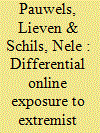| Srl | Item |
| 1 |
ID:
144926


|
|
|
|
|
| Summary/Abstract |
The present study applies Social Learning (Differential Association) Theory to the explanation of political violence, focusing on exposure to extremist content through new social media (NSM) and controlling for key variables derived from rival theories. Data are gathered using (a) a paper-and-pencil study among high school students, and (b) a web survey targeting youths between 16 and 24 years old. A total of 6020 respondents form the dataset. Binary logistic regression is used to analyze the data. Results show that even when controlling for background variables, strain variables, personality characteristics, moral values, and peer influences, the statistical association between measures of extremism through NSM (ENSM) and self-reported political violence remains significant and fairly constant. The most persistent effects are found for those measures where individuals actively seek out extremist content on the Internet, as opposed to passive and accidental encounters using NSM. Furthermore, offline differential associations with racist and delinquent peers are also strongly and directly related to self-reported political violence, as are some mechanisms from rival perspectives. This indicates that political violence can only partially be explained by social learning and suggests that the impact of ENSM is mediated by real-world associations and that the offline world has to be taken into account.
|
|
|
|
|
|
|
|
|
|
|
|
|
|
|
|
| 2 |
ID:
174568


|
|
|
|
|
| Summary/Abstract |
This article examines how the mediatised context of foreign policy provides new opportunities for political leaders to both frame and project their own leadership role to new audiences. The past ten years have witnessed a sharp rise in political leaders’ use of new social media to communicate on a range of foreign policy issues. We argue that this new media context of foreign policy, combined with a bolstered leadership mandate, has been central to the construction of a more visible public leadership role for the EU High Representative in the post-Lisbon era. Departing from recent scholarship on performative leadership and new media in International Relations theory, we develop an original theoretical framework drawing on Erving Goffman’s dramaturgy of impression management. We employ the concept of “leaderisation” to analyse how mediatisation shapes the leadership process in terms of personification and drama to enable new forms of interaction with followers. We apply this framework in an illustrative case study focusing on the process of negotiating the EU Global Strategy. This diplomatic process provided the High Representative Mogherini with a stage on which she could frame herself in a central leadership position vis-à-vis European citizens to mobilise greater legitimacy for the EU as a global actor.
|
|
|
|
|
|
|
|
|
|
|
|
|
|
|
|